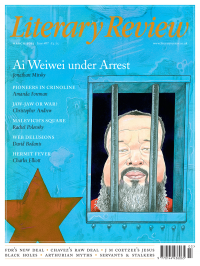Scott Bradfield
Back to Blood
The Accursed
By Joyce Carol Oates
Fourth Estate 669pp £18.99
There is no rest for the weary devotee of Joyce Carol Oates, who writes books faster than most readers can consume them, spewing forth large literary novels, variously sized young-adult novels, novellas, thick collections of short stories, essays and reviews, and even batches of thrillers under pseudonyms. The most frustrating part about being a fan of Oates’s work (and I consider myself one) has to do with simple logistics: which books should we read next and why should we choose this particular book over all those others? This is because while many of her books and stories are very good (collections such as Haunted and The Collector of Hearts or her novel You Must Remember This), others are just mildly good. As a result of these constantly mounting opportunities and missed opportunities, anybody who decides to read one of Oates’s recent novels or collections will find themselves trapped in a quandary of self-doubt.
Oates is not a genre writer, but like most writers sincerely engaged in the job of telling stories, she isn’t afraid of genre motifs, and The Accursed is packed to the gills with them: ghouls, succubi, vampires, body snatchers, a plague of snakes consorting with schoolgirls, child-devouring beasts in the

Sign Up to our newsletter
Receive free articles, highlights from the archive, news, details of prizes, and much more.@Lit_Review
Follow Literary Review on Twitter
Twitter Feed
It wasn’t until 1825 that Pepys’s diary became available for the first time. How it was eventually decrypted and published is a story of subterfuge and duplicity.
Kate Loveman tells the tale.
Kate Loveman - Publishing Pepys
Kate Loveman: Publishing Pepys
literaryreview.co.uk
Arthur Christopher Benson was a pillar of the Edwardian establishment. He was supremely well connected. As his newly published diaries reveal, he was also riotously indiscreet.
Piers Brendon compares Benson’s journals to others from the 20th century.
Piers Brendon - Land of Dopes & Tories
Piers Brendon: Land of Dopes & Tories - The Benson Diaries: Selections from the Diary of Arthur Christopher Benson by Eamon Duffy & Ronald Hyam (edd)
literaryreview.co.uk
Of the siblings Gwen and Augustus John, it is Augustus who has commanded most attention from collectors and connoisseurs.
Was he really the finer artist, asks Tanya Harrod, or is it time Gwen emerged from her brother’s shadow?
Tanya Harrod - Cut from the Same Canvas
Tanya Harrod: Cut from the Same Canvas - Artists, Siblings, Visionaries: The Lives and Loves of Gwen and Augustus John by Judith Mackrell
literaryreview.co.uk